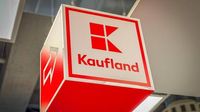Kaufland, the German supermarket chain owned by the richest man in Germany, Dieter Schwarz, is facing serious allegations regarding employee treatment and hygiene standards. With an annual turnover of approximately 34 billion euros, the company is under scrutiny for the working conditions of its employees and reports of unsanitary practices in its stores.
Recent investigations by the magazine Stern and the RTL program Team Wallraff have revealed alarming insights into the internal workings of Kaufland. Employees have come forward to share their experiences, painting a picture of a workplace fraught with pressure and fear. Timo R., a former branch manager, disclosed that staff often start their shifts as early as 2 or 3 AM and work long hours, sometimes until 6 PM. He described a culture where management constantly monitors performance metrics, with pressure exerted through emails and WhatsApp groups. "The craziest thing is that it became unofficially normal to start unloading trucks at 2 or 3 AM and then work until 5 or 6 PM," he said.
Moreover, Timo R. spoke about the existence of 'flop lists'—documents that highlight the five branches with the lowest sales or the most waste from the previous day. He expressed that it felt like being publicly shamed, stating, "The ideal branch manager is someone who doesn’t question anything. They just need to keep the numbers in check." One manager allegedly remarked, "You’re all like my spinning tops—I have to hit you regularly to keep you moving." This atmosphere of intimidation has raised concerns about the psychological well-being of employees.
Kaufland has responded to these allegations, asserting that they treat their employees with respect and are committed to maintaining a positive work environment. A spokesperson stated, "We value our employees and invest in training our managers and providing attractive working conditions." However, the reality described by employees suggests a stark contrast to this official stance.
Regine W., a professor at the Duale Hochschule at the Bildungscampus Heilbronn, corroborated these claims, stating, "Many people go to work with fear. They always find ways to put pressure on employees. Then things are exaggerated, and threats are made... There is indeed a culture of fear." She also raised concerns about the influence of Kaufland on the grading of students, suggesting that professors face repercussions for failing students associated with the company.
In a related incident, Kaufland has recently faced criticism over hygiene standards in its stores. Following reports of irregularities, management personnel were replaced in two branches located in Bad Tölz and Homburg. Investigative reports revealed that employees at the fresh food counter in Bad Tölz manipulated expiration dates, while issues such as defective freezers and mold were documented. In Homburg, there were allegations of mice infestations.
A spokesperson for Kaufland acknowledged the pest issue, admitting to a "pest infestation" in Homburg. The company stated, "The representations in the report do not reflect our strict guidelines for handling food and hygiene." They claimed that prior to the media reports, they had already initiated measures to address these deficiencies and that most issues had been resolved.
The situation has escalated recently, particularly at the Kaufland logistics site in Donnersdorf, where a demonstration took place on January 31, 2025. Up to 350 employees—about two-thirds of the workforce at that location—are set to lose their jobs as part of a restructuring plan aimed at maintaining competitiveness. Kaufland confirmed that the dismissals are a done deal and that they will be replaced by subcontracted workers from Eastern Europe, who will operate under different labor conditions. This move has raised concerns about the lack of accountability for working conditions and employee rights.
"We come to work sick because we’re afraid we’ll be fired before we even get a chance to recover. The conditions are catastrophic for everyone," lamented one employee. The situation has drawn the attention of federal politicians who have called for an end to subcontracting practices that undermine workers’ rights.
As Kaufland continues to navigate these serious allegations, the question remains: how will the company address these issues moving forward? The Dieter Schwarz Stiftung GmbH, which oversees many of Kaufland's initiatives, has stated that they guarantee the freedom of research and teaching in all projects related to higher education.
Despite the company's assurances, the testimonies from employees and the findings from independent investigations paint a troubling picture of life behind the scenes at Kaufland. As the largest supermarket chain in Germany, with over 770 branches and more than 90,000 employees, the implications of these reports extend far beyond individual stores. The ongoing scrutiny may compel Kaufland to reevaluate its internal practices and prioritize the well-being of its workforce.
In light of these revelations, consumers and employees alike are left to ponder the true cost of low prices and high profits in the retail industry. As Kaufland faces mounting pressure from both public opinion and regulatory scrutiny, it remains to be seen whether meaningful changes will be implemented to improve working conditions and uphold hygiene standards across its stores.


